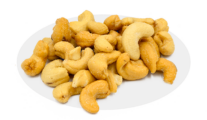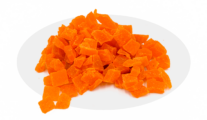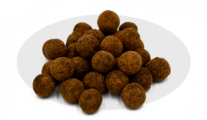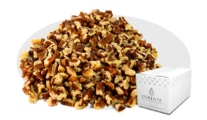Written By Sam Henselijn
Can Your Dog Eat Almonds? Dogs typically find anything their human friends are eating to be almost irresistible. No matter how lovingly they stare at your snack, remember that pups can’t digest every human food. Some kinds of nuts may even be toxic. Can Your Dog Eat Almonds?
Almonds are one of the most popular nuts consumed worldwide. They pack so much nutrition that they’re considered a superfood for humans. But can dogs eat almond-based treats? Before you toss a few nuts to your pup, read on to learn some important facts about dogs and almonds.
Can dogs eat almonds?
Some nuts are toxic to dogs. These include the walnut family and
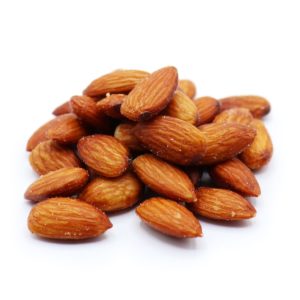
pecans. Amongst all nuts, macadamia nuts are widely known as the most dangerous to dogs.
But how about almonds? Are they off-limits too? The short answer is yes. While almonds aren’t likely to be toxic, your pup probably shouldn’t eat more than one or two.
Nuts are simply not handled well by dogs’ digestive systems and can cause obstructions. They also present a choking hazard, not to mention other dangers to your dog’s health. Another thing to consider is that a lot of nuts are either salted or seasoned, which is a big no-no for dogs.
Why are almonds bad for dogs?
Almonds, even if not technically toxic, can sometimes harbor a kind of mold called Aspergillus mold. The problem is that this mold contains Aflatoxin. This substance can be poisonous for dogs, as canines are particularly affected by it.
Besides, dogs’ digestive systems don’t process the protein in almonds well, which can cause gastrointestinal blockages. Additionally, albeit not common, dogs may have an allergic reaction to almonds. In rare cases, this can lead to anaphylaxis, a potentially life-threatening condition.
If you notice signs of an allergic reaction, including sneezing, coughing, swelling, or difficulty breathing, contact your vet right away.
Fluid retention
Dogs love the savory taste of almonds, but packaged nuts are often seasoned with salt and other flavorings. Too much salt makes your dog super thirsty and causes increased water retention. Water Retention can be very dangerous to dogs with heart ailments.
Risk of pancreatitis
In some animals, the high-fat content in almonds can lead to conditions like pancreatitis. This happens when the pancreas becomes inflamed and painful. Some breeds of dogs are more prone to developing pancreatitis. These include Cocker Spaniels, Poodles, Miniature Schnauzers, and Dachshunds.
Affected animals may present several symptoms. Be on the lookout for vomiting, diarrhea, abdominal pain, and lethargy. This scenario can quickly lead to dehydration, which is extremely dangerous to dogs.
How about almond butter?
The way almond butter is prepared is by grinding raw or roasted almonds. This process actually increases the bioavailability of nutrients and makes it easier for dogs to digest the nuts.
This means almond butter is generally safe for dogs in small quantities. However, there are still risks. Due to the high fat content, too much almond butter can still cause tummy aches or lead to pancreatitis.
Also, many kinds of almond butter contain salt, honey, vanila or artificial sweeteners. Some of which may be toxic to dogs, so always check the label.
What to Do If Your Dog Eats Almonds
If your dog eats one or two almonds, don’t panic. A couple of almonds aren’t likely to do any harm, as long as your furry friend isn’t allergic. Instead, monitor them for signs of or choking. However, if your dog ingests almonds in a large amount, don’t wait for symptoms. Contact your vet right away for professional advice.
Conclusion Can Your Dog Eat Almonds?
Although almonds are healthy for human consumption, they are not necessarily the best snack option for dogs. Our canine companions have different nutritional needs than us. Your dog may safely eat a couple of almonds, but more than that is not recommended. Almond butter is a better option, but again, only in moderation.
Our Almonds
Ok, now that we’ve established that nuts aren’t the best for pups, we can go back to considering what’s good for us, humans. And there’s no question there: almonds are awesome! These popular nuts are delicious, incredibly buttery, and full of health benefits. What’s not to love?
While great simply for snacking, you can also use salted roasted almonds or raw almonds as an ingredient. They go great in salads, mixed into grain recipes, sprinkled over fish, and in baked goods and desserts. Almonds are super versatile in the kitchen! If you just want a little something sweet to nibble on, do yourself a favor and try our yogurt covered almonds! An even healthier, but equally delicious option, our
sugar free dark chocolate almonds have all the flavor, with zero guilt.
FAQ Can Your Dog Eat Almonds?
Can dogs eat almonds?
While almonds are not toxic to dogs, they are not recommended as a snack for your pet. Dogs’ digestive systems cannot handle nuts well, which can lead to gastrointestinal blockages and other health issues.
Why are almonds bad for dogs?
Almonds can sometimes contain Aspergillus mold, which produces aflatoxin that is poisonous to dogs. Additionally, almonds may cause gastrointestinal blockages, pose a choking hazard, and potentially lead to an allergic reaction, including anaphylaxis in rare cases.
What should you do if your dog eats almonds?
If your dog eats one or two almonds, monitor them for any signs of distress or choking. However, if your dog ingests a large amount of almonds, contact your veterinarian immediately for professional advice.
Sam Henselijn Author’s Biography – Meet L’Orenta Nuts CEO
Copyright 2024 L’Orenta Nuts
L’Orenta Nuts proudly holds the SQF food safety certification, symbolizing our unwavering dedication to upholding the highest standards of food safety and quality. This certification guarantees that our products undergo rigorous scrutiny, ensuring transparency, traceability, and adherence to global food safety regulations for the utmost consumer confidence.
L’Orenta Nuts has the HACCP (Hazard Analysis and Critical Control Points) certification is a systematic approach to identifying, evaluating, and controlling food safety hazards. It ensures that food products are produced and handled in a manner that minimizes risks and complies with safety standards.
Our GMP (Good Manufacturing Practices) certification ensures that a manufacturing facility adheres to comprehensive quality and safety standards while producing pharmaceuticals, food, and other consumer goods, promoting consistency, quality, and compliance with regulatory requirements.
L’Orenta is an FDA-approved manufacturing facility and has met the rigorous standards set by the U.S. Food and Drug Administration. It demonstrates compliance with regulations, ensuring the production of safe and high-quality food products.



